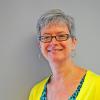
Caitlin and Malory Hendel, before heading out to the Women’s March in Topeka, Kansas, Jan. 21. (John Hendel III)
I don't share this often, but I am the mother of a young woman with special challenges. I don't like to use the term "special needs," because she has the same needs as the rest of us — love, friendship, respect, the occasional belly laugh. But she doesn't pick up on things quite as quickly as others might, she misses social cues, struggles with subtlety and broad concepts, and has a hearing loss and stutter that make communication difficult at times.
We moved back to Kansas City four years ago to make life better for her. While there are many opportunities in Washington, D.C., for people with disabilities, our families are here and life is just simpler. We prayed often over the decision to return, and there are still days when I wonder whether we should have stayed out East. But in the last few months, we've watched our longtime prayer for independence for our daughter start to be answered.
This spring, she got a driver's license and has been driving to some places on her own. (This is a big deal.) She will graduate at the end of May from a local community college where she has excelled in Microsoft Office and other skills that will qualify her for administrative assistant work. She had an internship this spring at the local Special Olympics office. And she is about to start a new — paying — job, as a paraeducator in a local school district. That job is part-time and temporary, but she has also received a second offer at another school for full-time work, with benefits, in the fall. (I need to say that one more time: WITH BENEFITS. Thank you.)
Our daughter turns 28 in early May. She is at a point in life that many daughters would have reached years ago. But watching her work with her struggles, occasionally succumbing to them, but mostly pushing through them, has taught me so much.
First, every person is different, and we need to get over the idea that others must think and act according to our individual views of what is acceptable.
Second, patience is more than a virtue — it's a requirement for living. Patience with yourself, with others, with the ups and downs of life. It took our daughter nine years to go from high school to a paying job. But she did it. And our pride in this accomplishment is beyond measure.
Third, people with physical and mental disabilities constitute one of the most marginalized groups in the world. Our governments, our churches, our institutions and our society must start to recognize the humanity of this group and to strive to widen, straighten and smooth the paths in front of them so that they can live with us and not just among us.
I have met many moms over the years who have taken challenging journeys with their children, who have cheered their successes and held them through the hard moments. Who go off somewhere to cry from time to time, but who always put on that genuine smile for the world — and especially for their children — to see.
For those mothers in particular, and for all of the women in the NCR community, I wish you a blessed Mother's Day.
[Caitlin Hendel is publisher of the National Catholic Reporter Publishing Company.]




